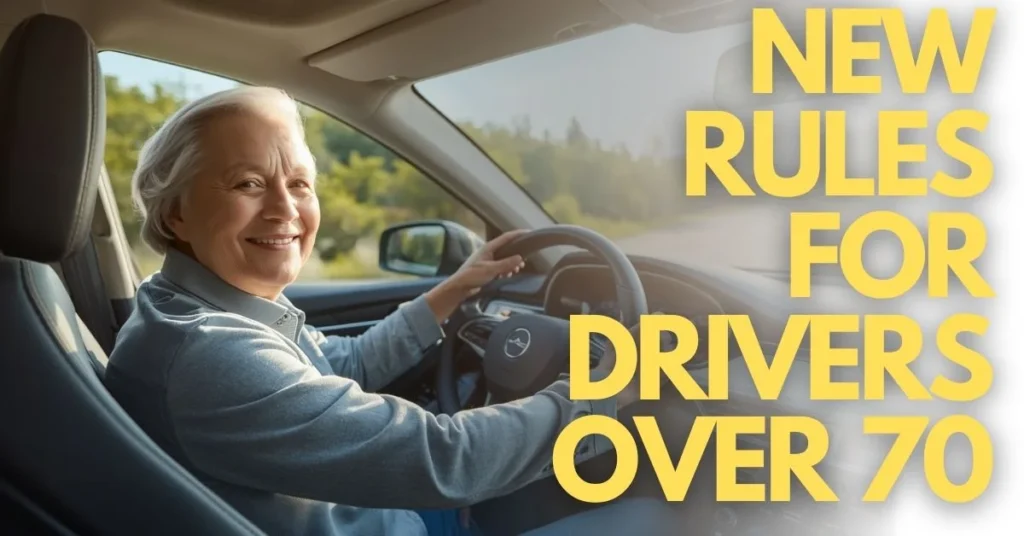Driving offers freedom and independence, a connection to community, and the ability to manage daily life. For senior drivers, holding onto that independence is vital. As we age, however, physical and cognitive changes can affect driving abilities. To address this, transportation authorities regularly review and update regulations. Understanding the new rules for drivers over 70 is crucial for staying safe, compliant, and confident behind the wheel. This guide breaks down the latest changes, explains the reasoning behind them, and offers practical advice for senior drivers and their families.
Table of Contents
Why Are There Special Rules for Senior Drivers?
The implementation of specific rules for drivers over 70 is not about age discrimination. It’s about public safety—for the senior driver and everyone else on the road. Age-related health conditions can impact driving skills. These can include slower reaction times, vision or hearing impairment, and decreased flexibility.
Statistics show that while older drivers are generally safe and experienced, they have a higher crash rate per mile driven than most other age groups. They are also more susceptible to serious injury or fatality in an accident. The new rules for drivers over 70 aim to strike a balance: enabling experienced drivers to maintain their mobility while ensuring they can still operate a vehicle safely.
| Age Group | License Renewal Requirements | Tests Required | Other Information |
| 70–79 years | Regular license renewal | Vision and reflex tests | License renewal every 5 years. |
| 80–86 years | In-person renewal every 2-4 years | Vision, reflex, and cognitive tests | More frequent testing based on state requirements. |
| 87 years & older | Annual in-person renewal | Driving test, vision, and cognitive assessments | Medical clearance may be necessary. |
Key Changes in a Nutshell: What Are the New Rules for Drivers Over 70?
While regulations can vary significantly by state or region, several common themes have emerged in recent updates. These changes often revolve around more frequent license renewals and mandatory screenings. The goal is to identify potential risks before they lead to an incident on the road.
Reporting Concerns for Senior Drivers
If you’re concerned about a senior driver’s ability to operate a vehicle safely, you can report these concerns to your local Department of Motor Vehicles (DMV). Elderly drivers will then be required to undergo re-evaluation to determine whether it’s safe for them to continue driving.
More Frequent License Renewals
One of the most common adjustments involves the frequency of license renewals. While a younger driver might renew their license every eight or ten years, seniors are often required to renew more frequently.
- Standard Renewal Cycle: Every 1-5 years, depending on the state.
- Purpose: This allows the Department of Motor Vehicles (DMV) or licensing agency to check in more regularly.
- In-Person Requirement: Many states now mandate that drivers over a certain age must renew their license in person, eliminating mail-in or online options. This ensures a vision test can be administered and allows staff to observe the applicant for any obvious cognitive or physical difficulties.

Mandatory Vision and Hearing Tests
Clear vision and adequate hearing are fundamental to safe driving. New rules often strengthen the requirements for these sensory tests.
- Vision Screening: Most states require drivers over 70 to pass a vision test with each renewal. Some have stricter acuity standards (e.g., 20/40 or better with corrective lenses).
- Field of Vision: In addition to sharpness, tests may assess peripheral vision, which is critical for spotting hazards from the side.
- Hearing Tests: While less common than vision tests, some jurisdictions are introducing basic hearing assessments. The ability to hear emergency sirens, horns, and other auditory cues is an important part of situational awareness.
Maintaining your car in good condition, including knowing how to jump start a car, is essential for all drivers.
Medical Evaluations and Physician Reports
Some new regulations require drivers over 70 to provide a medical report from their doctor. This is especially true for drivers with known medical conditions that could affect their driving, such as:
- Diabetes
- Cardiovascular disease
- Neurological disorders (e.g., Parkinson’s, dementia)
- Conditions causing seizures
- Sleep apnea
A physician can provide a professional opinion on whether their patient is medically fit to drive, sometimes recommending restrictions such as “daylight driving only” or “no highway driving.”
In addition to medical evaluations, keeping your vehicle in top shape by following a Car Maintenance Checklist is equally important.
In-Person Driving Tests and Knowledge Exams
In certain situations, a licensing agency may require a senior driver to retake the written knowledge test or the on-road driving exam. This is not usually a blanket requirement for everyone over 70. Instead, it is typically triggered by:
- A request from a law enforcement officer or physician.
- A report from a concerned family member.
- Involvement in a recent at-fault accident.
- Failure to pass a vision or medical screening.
The purpose is to re-verify that the driver understands current traffic laws and possesses the necessary skills to navigate modern road conditions. Understanding modern car features, such as What is Traction Control ?, can help you perform better during driving tests.
State-by-State Variation: A Comparative Look
It is essential to remember that driver’s license regulations are set at the state level. The rules in California will differ from those in Florida or Illinois. The table below provides a general overview of how requirements can vary.
| Requirement | State A (Example: California) | State B (Example: Illinois) | State C (Example: Florida) |
| Renewal Age Trigger | Age 70 | Age 75 | Age 80 |
| Renewal Frequency | Every 5 years | Every 2 years (ages 81-86), annually (age 87+) | Every 6 years |
| In-Person Renewal | Mandatory for all renewals | Mandatory for all renewals | Mandatory for all renewals |
| Vision Test | Required at every renewal | Required at every renewal | Required at every renewal |
| Road Test | May be required based on various factors | May be required if involved in an accident | Not required based on age alone |
| Physician’s Report | May be requested by the DMV | Not required based on age alone | Not required based on age alone |
Note: This table is for illustrative purposes only. Always check with your local DMV for the most current and accurate regulations.
State-Specific Rules for Drivers Over 70
Different states have different rules. Here’s a quick look at how the new regulations for drivers over 70 vary by state:
| State | Rules for Drivers 70+ |
| California | Requires in-person renewals starting at age 70 |
| Florida | Vision tests required for drivers 80+ |
| Texas | Requires cognitive and reflex tests for elderly drivers |
How to Prepare for Your License Renewal
Facing these new rules can be stressful, but preparation can make the process smoother. Here are some proactive steps you can take.
- Schedule Regular Health Check-ups: Visit your doctor and optometrist annually. Discuss your driving with them and ask for an honest assessment of your fitness to drive. Keeping prescriptions for glasses or hearing aids up to date is essential.
- Take a Driver Refresher Course: Organizations like AARP and AAA offer mature driver safety courses. These programs review defensive driving techniques, traffic laws, and provide tips for adjusting to age-related changes. Completing a course may also earn you an insurance discount.
- Perform a Self-Assessment: Be honest with yourself about your driving abilities. Are you having more close calls? Do you feel anxious in heavy traffic or at night? Recognizing challenges is the first step to addressing them.
- Know Your State’s Rules: Visit your state’s DMV website or call them well in advance of your renewal date. Understand exactly what documents and tests will be required so you can arrive prepared.

The Role of Family and Friends
Family members often play a critical role in this transition. It can be a difficult conversation to have, but it’s one rooted in love and concern. If you are worried about an older loved one’s driving, approach the topic with sensitivity.
- Observe their driving: Ride with them to see firsthand how they handle different situations.
- Focus on safety: Frame the conversation around their safety and the safety of others.
- Suggest alternatives: Research local transportation options like ride-sharing services, public transit for seniors, or volunteer driver programs.
- Involve a trusted authority: A doctor or a respected family friend can help mediate the conversation and lend credibility to the concerns.
Family members can assist by staying informed about Toyota Recalls to ensure vehicle safety.
Conclusion
The new rules for drivers over 70 are designed to ensure that senior drivers can continue driving safely and independently. These changes help protect both the elderly drivers and others on the road. It’s essential for senior drivers to understand these new regulations and prepare for the tests that may be required. Regular vehicle maintenance, such as checking your engine and transmission, is also crucial to staying on the road with confidence.
But there’s no need to panic. When it comes to the federal government instituting age-related rules – pump the brakes. That rumor is false.
At American Motors Hub, we offer top-quality used engines and transmissions that keep your vehicle running smoothly. If you need more information or help with your car, don’t hesitate to reach out to us!
Frequently Asked Questions
-
Are the new rules for drivers over 70 the same everywhere?
No, requirements vary by state. Always check your local DMV for specific rules.
-
Will I lose my license when I turn 70?
No, but you may need to renew more often and complete additional tests.
-
What happens if I fail a vision or medical test?
You may be asked to see a doctor or update your corrective lenses before retesting.
-
Can my doctor or family report concerns about my driving?
Yes, in many areas, doctors and family can report concerns to licensing authorities.
-
What if I can’t drive anymore?
Explore local options like public transport, ride-sharing, or senior transportation services.



